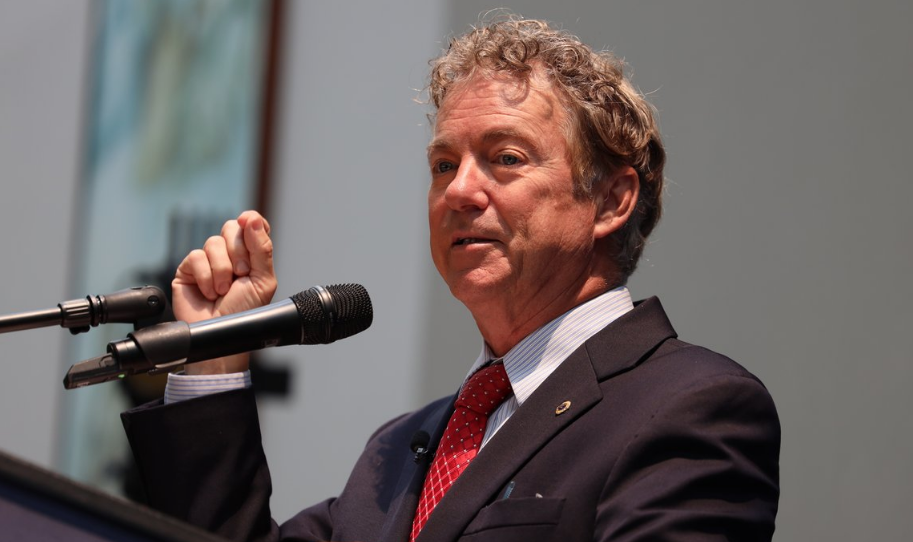This Is What an Actually Effective Filibuster Looks Like
Corey Booker might have rambled the longest, but Rand Paul made an impact.

Senator Cory Booker (D-NJ) recently broke the record in how long anyone had spoken in the Senate chamber, ever—for 25 hours—besting the former record held by Senator Strom Thurmond of South Carolina (at that time a Democrat).
It is well known that Thurmond’s 1957 filibuster was against civil rights. What was Booker’s issue or focus?
I read a half dozen legacy media stories on it, all praising Booker’s Herculean effort to oppose the Trump administration. But it was not clear at all what Booker’s point was. I don’t necessarily agree with everything this administration is doing, but what was the actual purpose of what Democrats hailed as the “longest filibuster in U.S. Senate history?”
It wasn’t an actual filibuster in that Booker wasn’t trying to hold up a particular vote or piece of legislation. He talked about Elon Musk, of course. POLITICO framed it this way: “Over the course of his speech, Booker touched on a range of Trump administration policies and GOP legislative plans, including Trump’s plans for tariffs, the Elon Musk-led effort to slash the federal bureaucracy and the potential cuts to Medicaid embedded in a House GOP budget plan.”
So he talked about many different things? Something any senator could basically do at any time?
The journalist Michael Tracey came to the same conclusion I did: “Cory Booker broke Strom Thurmond's all-time filibuster record... for no particular reason? Just to talk for a really long time, and receive plaudits for doing so?” Pretty much.
Senator Rand Paul did not receive immediate universal plaudits when he launched a filibuster on March 6, 2013 that spilled over into the next day.
Paul’s 13-hour talking marathon was not so long as Booker’s, but it was an actual filibuster, and it did have a singular point: Paul was blocking a vote for President Barack Obama’s nominee to head the CIA, John Brennan. Paul’s demand was that the administration answer whether or not it believed it had the right to drone American citizens on U.S. soil.
Paul’s filibuster came just a few years after Obama directed the CIA to carry out a drone strike on American citizen Anwar al-Awlaki in Yemen, who had never been charged with a crime. Two weeks later, another CIA drone strike in Yemen took out the 16-year-old son of Awlaki, Abdulrahman, who was also an American citizen, born in Colorado.
When Obama’s press secretary, Robert Gibbs, was asked about the due process–less killing of the American teenager, he replied that the kid should have “had a more responsible father.”
Paul’s question was legit.
The White House wouldn’t give a clear answer to Paul. Yet, if some in Washington thought he was just grandstanding in the beginning, the senator soon saw a groundswell of support as he continued to speak—not just from some Republicans who lent their voices to continue his filibuster, but even some Democrats.
Paul actually brought elements of the right and left together that day in ways that were unforeseen just hours prior.
I was working in the senator’s comms department at the time, and will never forget when the office was greeted by hard left antiwar activists Code Pink, who had come not to protest, but to deliver a giant pink heart addressed to Paul with slogans like “Stand with Rand!,” “Thanks for filibustering John Brennan,” and “Love, Code Pink” written on it.
Rush Limbaugh, who famously had few to no guests on his program, invited Paul on his show the very next day. “The neocons are paranoid,” Limbaugh told Paul of his hawkish Republican critics.
For the rest of the week, the senator was all over the media and getting attention from across the ideological spectrum. POLITICO reported at the time, “It may have been Paul’s biggest moment so far in the Senate. He captured the attention of conservatives, libertarians and even liberals who have long questioned the legal authority of the Obama administration’s use of drones for targeted killings.”
Even better, the reporter David Weigel noted that Paul’s filibuster had swung public opinion on drone use on American citizens in the senator’s direction by a whopping 50 percent.
When does that ever happen? On an issue that had not really been at the forefront of most Americans’ minds a mere 24 hours beforehand?
Brennan was eventually confirmed. But Paul had been heard, with the greatest impact imaginable.
All filibusters aren’t the same, but they usually have a point.
Subscribe Today
Get daily emails in your inbox
Thurmond was against civil rights. Paul was for civil liberties. Sen. Ted Cruz would hold a filibuster a few months after Paul’s to target Obamacare.
Booker’s point seemed to be little more than telling us that he and his party think Trump sucks. That’s not news. That’s not new.
Don’t expect it to move any polls. Much less minds.